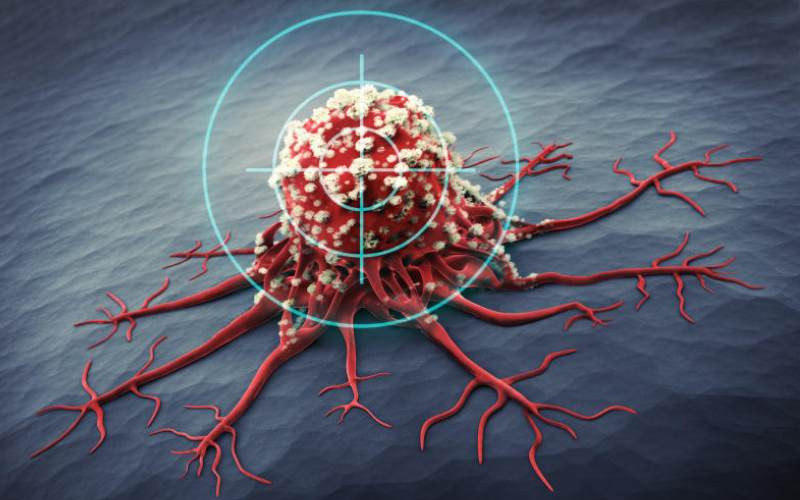
Portrait of black girl suffering solitude and depression
Judith Achieng' abandoned her two-year-old child at Kopiata Beach in Rarieda Sub-county, Siaya, after severe stress and depression led to a mental breakdown. Similarly, Maureen Kagwiria killed her brother following a dispute over debt, highlighting the devastating effects of unchecked mental health struggles.
The challenges faced by both Achieng' and Kagwiria are shared by many Kenyans, given the current socio-economic and political challenges exacerbated by government's poor policies.
Medical experts are advising people to stay alert to the early signs of stress and depression. The big question is: How often should one check their mental health status? This is a concern that all citizens must take seriously.
"I took up a job that is so strenuous, and l fear having a mental breakdown. Lately, I get irrigated easily and find myself in unnecessary arguments. I recently had a fight with a waitress at a local pub in Rageng'ni, Rarieda, Siaya over an argument about a glass for drinking beer that was not properly cleaned," laments Joseph Otieno, a teacher at a local primary school and a victim of stress and depression.
According to psychiatrist Dr Frank Njenga, it is widely accepted that as we age regular medical check-ups are essential for early detection of various diseases.
"It is a well-known fact in medicine that early detection often leads to better outcomes. Women are strongly advised to perform regular or monthly self-examinations of their breasts to detect any signs of breast cancer early," says Dr Njenga.
- Mental health summit calls for awareness, action and resilience
- Burnout crisis pushes Kenya's doctors toward breaking point, union warns
Keep Reading
He adds that, similarly, many men are now opting for prostate gland exams long before symptoms appear. After the age of 45, it is wise for both men and women to undergo regular tests to detect easily treatable colon cancer.
Early treatment
A visit to your doctor can save you from prolonged pain and suffering if the diagnosis is made early. Unfortunately, no such routine exists for mental health, and we lack an equivalent annual medical examinations, says a psychologist.
What is available, however, is a more reliable option that allows people to regularly check on themselves and their loved ones. For David Mutua, who took up a strenuous job, a change in life circumstances can often lead to stress, which is a precursor to more serious conditions, such as depression.
Whether one moves to a new house,starts a new job, or relocates to a different country, the stress of change can sometimes lead to mental health challenges. The pressure of adopting to a new environment can be a trigger for mental illness.
For Mutua, his strenuous new job causes stress which could escalate into a more serious condition like depression. It is crucial to watch for early signs of stress that may lead to depression, severe mental illness or even death. One of the key early symptoms of depression is difficulty sleeping, also known as insomnia.
"If you notice changes in your sleep pattern- such as struggling to fall asleep or waking up at 3 or 4 am and being unable to go back to sleep-you may be on the verge of a condition that requires medical attention," Dr. Njenga said at a medical workshop in Nairobi.
In reply to Mutua's account of his stressful and strenuous new job, Kenya's leading psychiatrist observes: The statement 'l live in fear of a mental breakdown' suggests that this job may have pushed Mutua into a state of stress, depression and anxiety. In such a condition, one experiences persistent boredom and remains in a heightened state of anxiety, even in the absence of any real threat.
A rapidly beating heart, excessive sweating, and trembling are additional symptoms of anxiety linked to Mutua's demanding job and the stress it brings to his life.
Medical experts, especially mental health specialists, can assess your well-being based on the symptoms and explanations you present. A crucial statement often made by potential victims of stress and depression is, "Lately, I find myself getting irritated easily."
Symptoms
The key word here is "lately," indicating that something new is developing. It signals to the doctor that this irritability is not part of your usual behavior but a recent change.
A new job, a difficult life situation, and your own admission of increased irritability are strong indicators of mounting stress. If left unchecked, this can escalate into depression, posing a serious threat to your well-being.
Recognizing these early warning signs is essential before depression takes hold.
A boss shouting at employees, a woman firing her housemaid for no reason, a motorist driving recklessly, a man turning to heavy drinking, or engaging in unnecessary fights-these behaviors all stem from the same underlying mechanism of irritation.
If you notice such changes in your behavior that feel out of character, it is crucial to seek medical help. Recognizing the early signs of stress and depression can prevent the progression to mental illness and allow for timely intervention.
Common symptoms of stress and depression include persistent aches and pains, headaches, stomach issues that don't improve with treatment, difficulty concentrating, memory lapses, trouble making decisions, unexplained fatigue even after proper rest, and feelings of guilt, worthlessness, or helplessness.
Physical indicators of stress and depression may include dizziness, nausea, digestive problems, stomach upset, muscle tension, changes in appetite, a tight forehead, shortness of breath, and sweaty palms. Chronic stress, if left unaddressed, can severely impact both mental and physical health.
 The Standard Group Plc is a multi-media organization with investments in media
platforms spanning newspaper print
operations, television, radio broadcasting, digital and online services. The
Standard Group is recognized as a
leading multi-media house in Kenya with a key influence in matters of national
and international interest.
The Standard Group Plc is a multi-media organization with investments in media
platforms spanning newspaper print
operations, television, radio broadcasting, digital and online services. The
Standard Group is recognized as a
leading multi-media house in Kenya with a key influence in matters of national
and international interest.











